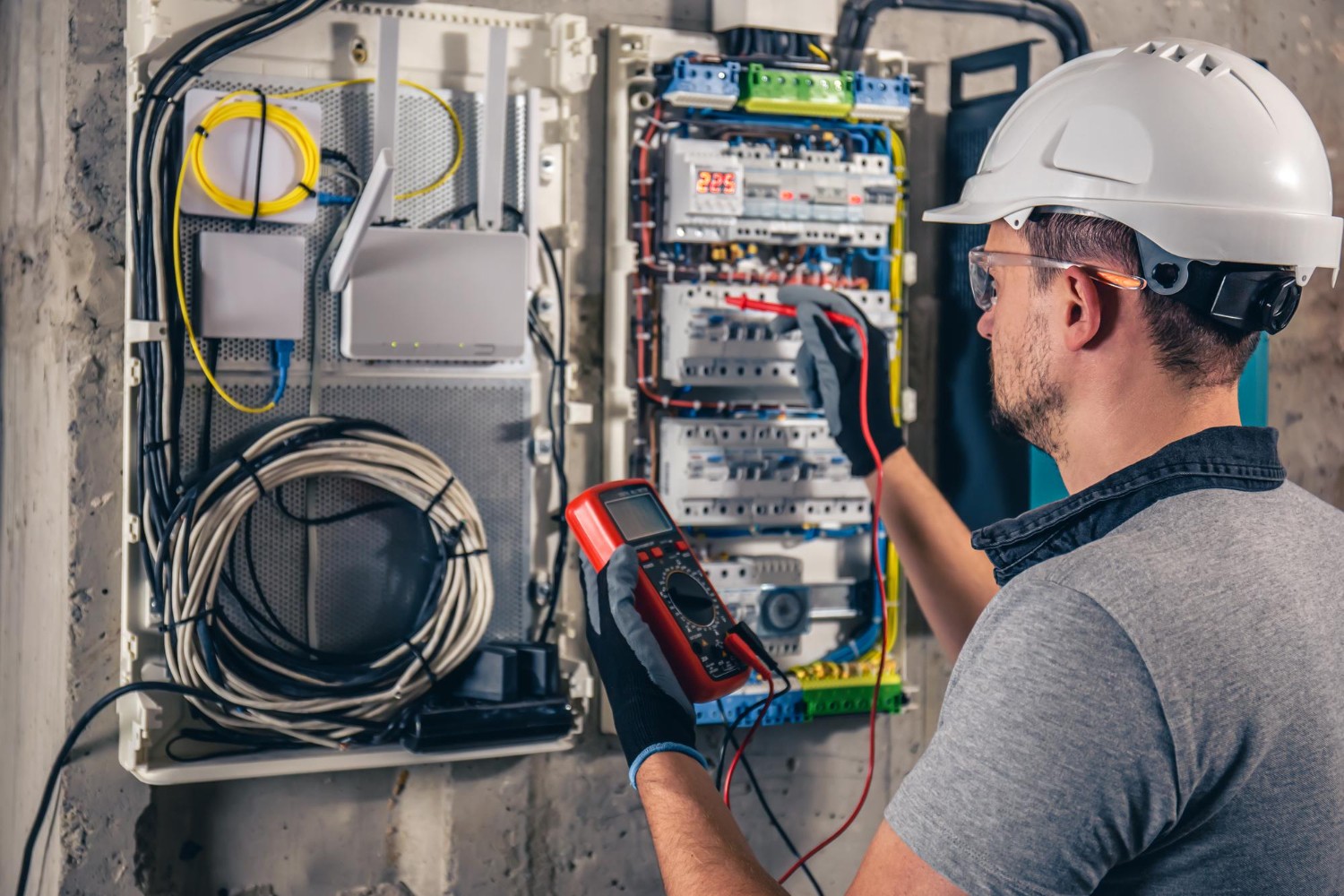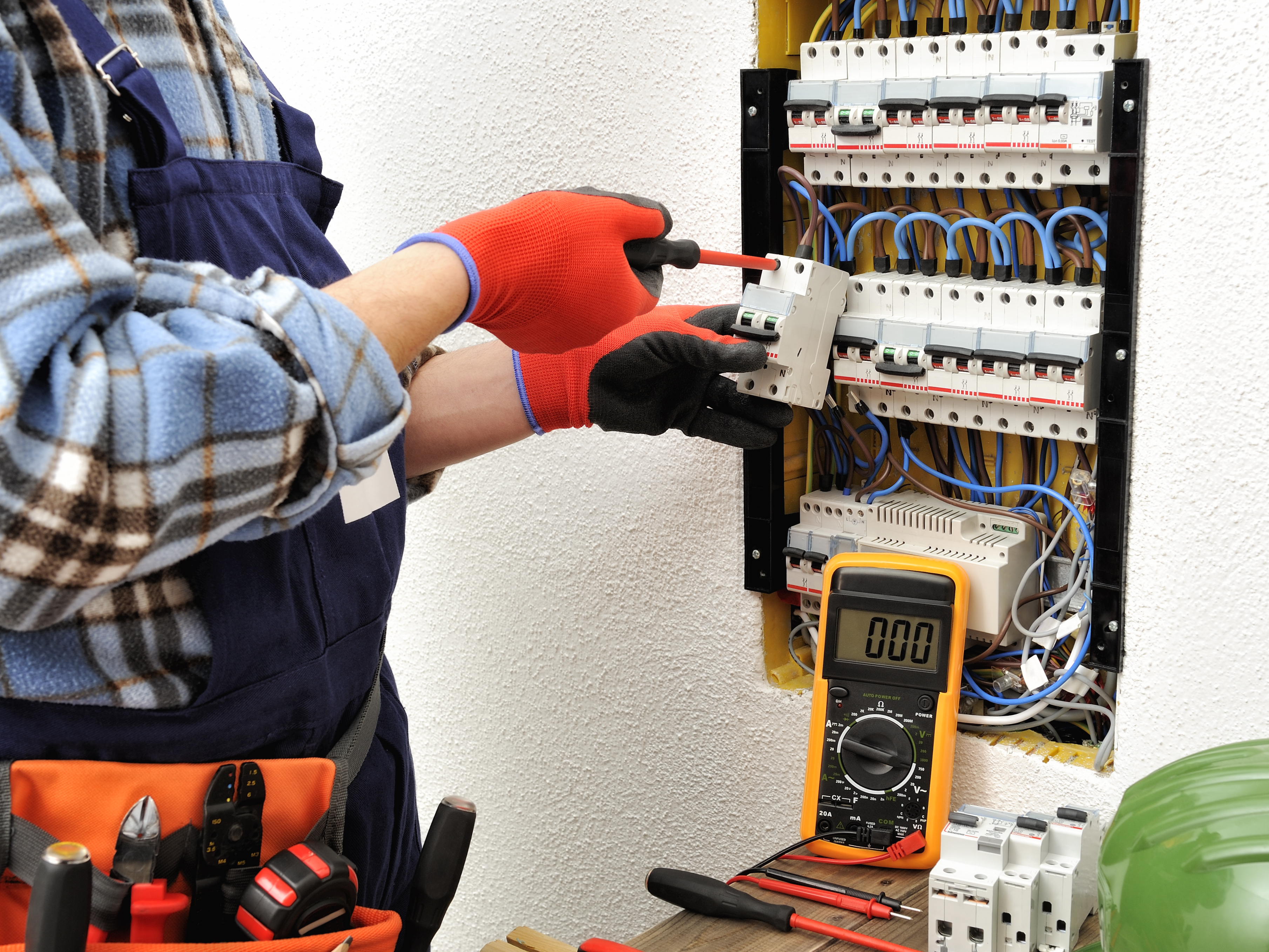Leading Industrial Electricians: Making Sure Security and Efficiency in Intricate Electrical Equipments
The Thorough Function of Industrial Electricians in Ensuring Reliable Power Circulation and Electrical Upkeep in Industrial Setup
The role of commercial electricians prolongs much beyond basic electric tasks; they are integral to the security and performance of commercial procedures. Their responsibilities include setup, maintenance, and repair of intricate electrical systems, guaranteeing compliance with rigorous security requirements. As sectors progress, the integration of innovative technologies and smart systems provides brand-new difficulties and opportunities for these professionals. Recognizing just how their knowledge not only safeguards operational continuity yet likewise adds to sustainability efforts increases critical concerns concerning the future landscape of electric maintenance in industrial setups. What effects does this have for the labor force and technological advancement?
Relevance of Industrial Electricians
In numerous commercial settings, the role of electricians can not be overemphasized. These specialists are integral to the procedure and maintenance of electric systems, making sure that power distribution is efficient and reputable. Their proficiency not just supports the daily functioning of making procedures yet also plays an important function in enhancing total work environment safety and security. Industrial electrical experts have specialized expertise of complicated electric systems, consisting of high-voltage devices and automated machinery, which are essential for contemporary industrial operations.
Furthermore, the need for skilled electrical contractors continues to expand, driven by advancements in innovation and boosted reliance on automated systems. As markets evolve, the requirement for electrical contractors that can set up, troubleshoot, and keep innovative electric framework comes to be vital. Their contributions extend past simple installment; they are principals in ensuring conformity with security laws and sector criteria, consequently minimizing threats linked with electrical failings.
Key Duties and Responsibilities
Industrial electricians often participate in a variety of key obligations that are vital to the smooth procedure of power distribution systems. One of their primary obligations consists of installing, preserving, and fixing electrical wiring and devices in industrial settings. This entails ensuring that electric systems adhere to security laws and industry requirements to avoid threats such as electric fires or equipment failure.
In addition to setup tasks, industrial electricians are responsible for troubleshooting and detecting electrical problems. They utilize specialized methods and devices to recognize faults in machinery and power distribution networks, ensuring that any kind of breakdowns are quickly dealt with to reduce downtime. licensed electrical contractor. Normal upkeep is one more critical facet of their function, where they execute preventative procedures and regular inspections to maintain systems functioning efficiently

Qualifications and abilities Required
Effectiveness in electrical systems is important for industrial electricians, as it allows them to successfully browse the intricacies of power circulation (licensed electrical contractor). A strong structure in electric concept, including knowledge of circuits, voltage, current, and resistance, is crucial. Industrial electrical experts have to possess an extensive understanding of electric codes and guidelines to make sure conformity with sector standards
In enhancement to technical knowledge, functional skills are critical. Proficiency in troubleshooting and problem-solving enables electrical contractors to identify and fix issues efficiently, minimizing downtime in commercial procedures. Experience with various devices and devices, such as multimeters, oscilloscopes, and power analyzers, is also needed for reliable repair and maintenance.
In addition, industrial electricians are often required to have official education and learning, commonly culminating in an associate degree or completion of an apprenticeship program. These programs give hands-on training and academic expertise, equipping electricians with the abilities required for the field.
Certifications, such as those from the National Institute for Qualification in Engineering Technologies (NICET), can further boost an electrician's qualifications, showing expertise and dedication to the career. Overall, a mix of education, functional experience, and technological skills is essential for success in this requiring function.
Security Criteria and Compliance
Conformity with safety and security criteria is a basic facet of the commercial electrician's duty official source in power circulation. Industrial electrical contractors are entrusted with sticking to a wide range of guidelines and policies established by organizations such as the National Electrical Code (NEC) and Occupational Safety and Wellness Administration (OSHA) These standards make sure not just the safe operation of electric systems yet additionally the defense of personnel and tools.
To accomplish conformity, electrical contractors should perform regular evaluations and upkeep of electrical systems, determining possible dangers and applying restorative actions. This consists of correct grounding, circuit security, and making use of ideal individual protective devices (PPE) By maintaining a comprehensive understanding of both nationwide and neighborhood codes, electricians can properly reduce risks related to electric work.
In addition, commercial electricians play a vital function in training employees on safety practices and emergency situation procedures. This education and learning fosters a society of safety within the see here office, minimizing the probability of accidents and making certain that all staff members know their responsibilities concerning electrical safety and security.

Future Trends in Electric Upkeep
As technology proceeds to develop, the future of electric maintenance in power distribution is increasingly identified by the combination of predictive analytics and wise systems. These improvements make it possible for commercial electrical contractors to move past conventional reactive upkeep methods, fostering a positive strategy that enhances system integrity and effectiveness.
One substantial trend is the adoption of Net of Things (IoT) tools, which promote real-time monitoring of electrical systems. This innovation enables for the collection of huge amounts of data, supplying insights into devices performance and possible failure factors. By leveraging anticipating analytics, electrical contractors can prepare for problems before they escalate, decreasing downtime and maintenance prices.
In addition, the execution of sophisticated automation technologies is transforming electric upkeep. Automated analysis devices can swiftly recognize faults and suggest corrective actions, improving the repair work procedure. This not just enhances reaction times yet also decreases human mistake.
Furthermore, the expanding focus on sustainability is driving the development of energy-efficient remedies and renewable resource combination. As commercial markets significantly embrace greener techniques, electrical experts will play a pivotal duty in preserving these systems, making certain that power distribution straightens with environmental criteria. Overall, the future of electrical maintenance promises enhanced sustainability, effectiveness, and reliability.
Conclusion
To conclude, commercial electrical contractors are important to the functionality and security of industrial atmospheres. Their expertise in setting up, keeping, and repairing electrical systems ensures trustworthy power distribution, which is important for operational efficiency. Adherence to safety requirements and regulations even more minimizes threats within the workplace. As technology progresses, the integration of wise systems and IoT tools will certainly improve precautionary maintenance techniques, advertising sustainability and power effectiveness in industrial settings. The function of commercial electrical contractors will certainly proceed to increase in value.
The duty of industrial electricians expands far past basic electric tasks; they are integral to the security and effectiveness of commercial procedures (industrial electrical companies). Industrial electrical contractors have specialized understanding of complex electrical systems, consisting of high-voltage devices and automated machinery, which are vital for contemporary industrial procedures
Moreover, industrial electrical experts work together with engineers and find out here various other specialists to make and execute reliable electrical systems customized to details industrial needs.Proficiency in electrical systems is important for industrial electrical experts, as it enables them to efficiently navigate the complexities of power circulation.In verdict, commercial electricians are vital to the performance and security of commercial environments.